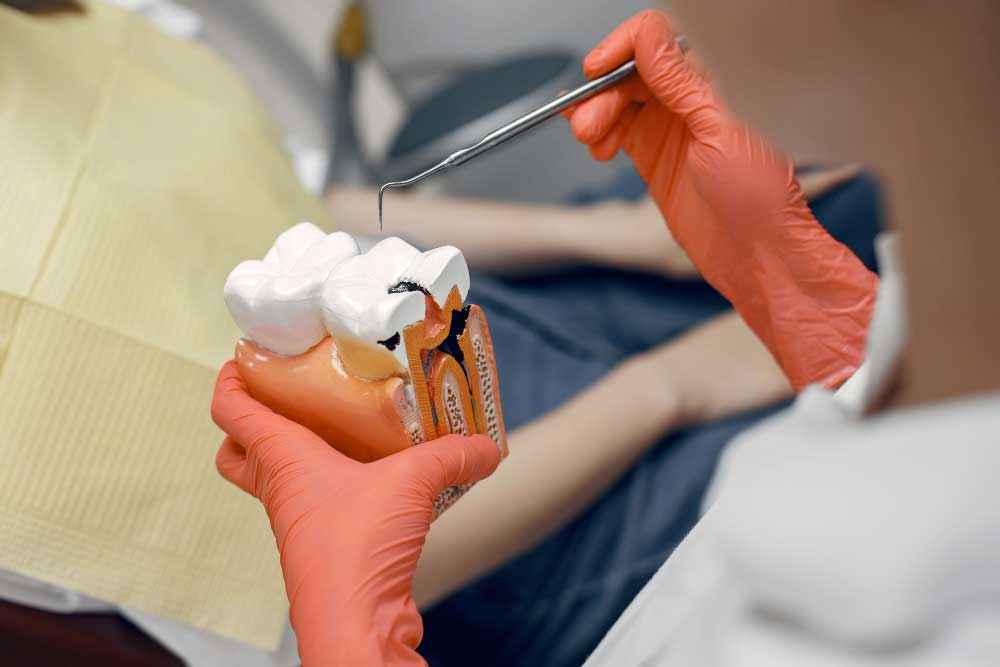
How Do I Know If I Need a Filling, Crown, or Root Canal?
Learn when you need a filling, crown, or root canal, and understand the signs to protect your dental health.
Dental Treatments
26 August 2024
Determining what treatment you need can be confusing when caring for your teeth. You might ask yourself, “Do I need a filling, a crown, or maybe even a root canal?” Understanding the difference and when each treatment is necessary can help you take charge of your dental health and avoid unnecessary pain.
Do I Need a Filling?
A filling is typically the first line of defence for smaller cavities caused by tooth decay. If you’ve noticed a bit of sensitivity or a twinge of pain when you bite down, especially with sweet, hot, or cold foods, that could be your tooth’s way of telling you it needs a filling.
Your dentist will remove the decayed bit of the tooth and fill it with a material like composite resin, which matches the colour of your tooth so it looks natural. This stops further decay and brings your tooth back to its normal function.
Signs You Might Need a Filling:
- Sensitivity to hot, cold, or sweet foods
- Visible holes or dark spots on your tooth
- Pain when biting or chewing
Do I Need a Crown?
Crowns are more involved than fillings. They could be the best option if your tooth is seriously damaged or weakened—maybe due to a large cavity, a crack, or after a root canal. A crown is like a cap that covers the entire tooth protecting it and restoring its strength and appearance.
Crowns are also standard for teeth with a root canal, as these teeth tend to be more fragile. They’re made from materials like porcelain, metal, or both and designed to look and feel like natural teeth.
Signs You Might Need a Crown
- A large cavity that a filling can’t fix
- A cracked or broken tooth
- A tooth that’s had a root canal
Do I Need a Root Canal?
Hearing the words “root canal” might make you uneasy. Still, it’s a procedure that can save a tooth that is badly infected or decayed. Suppose the tooth’s pulp (the soft tissue inside) is infected or damaged. In that case, a root canal might be required to remove the infected tissue and save the tooth.
During a root canal, your dentist will clean out the infected pulp, disinfect the area, and then fill and seal the tooth. Often, a crown is placed on top of the tooth after a root canal to give it extra protection.
Signs You Might Need a Root Canal
- Persistent, severe tooth pain
- Sensitivity to hot and cold that lingers
- Swelling or tenderness in the gums around the tooth
- A darkened or discoloured tooth
How Much Does It Cost?
The cost of dental treatments can vary based on a few factors, including how serious the issue is, the materials used, and where you’re located. Here’s a rough idea of what you might expect:
Cost of a Filling
Fillings are usually the most budget-friendly option. Depending on the filling material, the cost can range from $150 to $450 per tooth. Composite resin fillings, which match the colour of your teeth, tend to be pricier.
Cost of a Crown
Crowns are more expensive than fillings because they cover the entire tooth and are made from durable materials. Depending on whether the crown is made of porcelain, metal, or a combination, you can expect to pay between $1,000 and $2,500 per tooth.
Cost of a Root Canal
Root canals are more complex. Depending on the tooth’s location and complexity, the price can range from $1,000 to $2,000 per tooth. Molars, for instance, tend to be more expensive because they have more roots to treat.
Wrapping It Up
If you’re experiencing any of the symptoms mentioned above, visiting your dentist as soon as possible is essential. Early treatment can save you from more significant problems down the track and help you maintain a healthy, confident smile. At Innovative Dental, we’re here to help you determine the best treatment for your situation and ensure you receive top-notch care.
Remember, looking after your teeth isn’t just about avoiding pain; it’s about keeping your overall health in check.
The most critical factors for saving money, pain, and time are practising good oral hygiene, eating a healthy diet with less sugar, and finally, seeing your dentist regularly.





